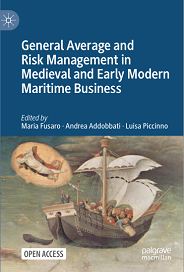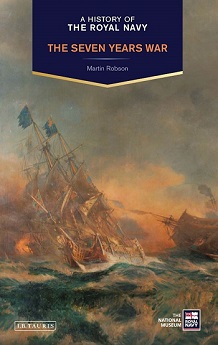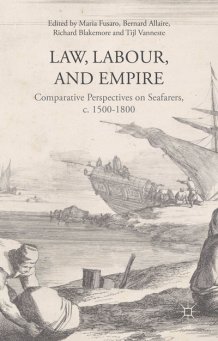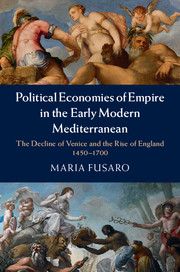Publications
Local knowledge, global change: a study of Lloyd’s Register surveyors 1834 – 1860
Elin Jones, Hindsight Perspectives for a Safer World – Report Series: No.2023.1, History & Policy at King’s College London and Lloyd’s Register Foundation, 2023
This report focuses on the history of Lloyd’s Register surveyors between 1834 (when the society reconstituted itself and set out on a recruitment drive) and 1860. These decades were an era of enormous technological change which saw the development of steam-powered paddle ships, screw-steamers and iron-clad vessels.
General Average and Risk Management in Medieval and Early Modern Maritime Business
M. Fusaro, A. Addobbati and L. Piccinno eds., (London: Palgrave-Macmillan, 2023)

"The scope of this volume is to provide an analytical synthesis of the multifaceted developments of Averages in Europe across the medieval and early modern period, though the focus will be primarily on those which today we know as General Average. There is a general average act when, and only when, any extraordinary sacrifice or expenditure is intentionally and reasonably made or incurred for the common safety for the purpose of preserving from peril the property involved in a common maritime adventure. This risk management tool has its origin in the pre-Roman Mediterranean and is still widely used in the shipping sector today. The volume traces its developments across Europe and the Spanish Atlantic from the Sixth to the Eighteenth Century, focusing both on its normative and operational practice elements."
The Maritime World of Early Modern Britain
Edited by Richard Blakemore and James Davey

Britain's emergence as one of Europe's major maritime powers has all too frequently been subsumed by nationalistic narratives that focus on operations and technology. This volume, by contrast, offers a daring new take on Britain's maritime past. It brings together scholars from a range of disciplines to explore the manifold ways in which the sea shaped British history, demonstrating the number of approaches that now have a stake in defining the discipline of maritime history. The chapters analyse the economic, social, and cultural contexts in which English maritime endeavour existed, as well as discussing representations of the sea. The contributors show how people from across the British Isles increasingly engaged with the maritime world, whether through their own lived experiences or through material culture. The volume also includes essays that investigate encounters between English voyagers and indigenous peoples in Africa, and the intellectual foundations of imperial ambition.
More details can be found at the Amsterdam University Press website.
Tempest: The Royal Navy and the Age of Revolutions
By James Davey

The French Revolutionary Wars catapulted Britain into a conflict against a new enemy: Republican France. Britain relied on the Royal Navy to protect its shores and empire, but as radical ideas about rights and liberty spread across the globe, it could not prevent the spirit of revolution from reaching its ships.
In this insightful history, James Davey tells the story of Britain’s Royal Navy across the turbulent 1790s. As resistance and rebellion swept through the fleets, the navy itself became a political battleground. This was a conflict fought for principles as well as power. Sailors organized riots, strikes, petitions, and mutinies to achieve their goals. These shocking events dominated public discussion, prompting cynical—and sometimes brutal—responses from the government.
Tempest uncovers the voices of ordinary sailors to shed new light on Britain’s war with France, as the age of revolution played out at every level of society.
More details can be found at the Yale Books website.
A New Naval History
Edited by Quintin Colville and James Davey

A New Naval History brings together the most significant and interdisciplinary approaches to contemporary naval history. The last few decades have witnessed a transformation in how this field is researched and understood and this volume captures the state of a field that continues to develop apace. It examines - through the prism of naval affairs - issues of nationhood and imperialism; the legacy of Nelson; the socio-cultural realities of life in ships and naval bases; and the processes of commemoration, journalism and stage-managed pageantry that plotted the interrelationship of ship and shore. This bold and original publication will be essential for undergraduate and postgraduate students of naval and maritime history. Beyond that, though, it marks an important intervention into wider historiographies that will be read by scholars from across the spectrum of social history, cultural studies and the analysis of national identity.
More details can be found at the Manchester University Press website.
A History of the Royal Navy: The Seven Years War
(London: I.B.Tauris, 2016)

The Seven Years War (1756-1763) was the first global conflict and became the key factor in creating the British Empire. This book looks at Britain's maritime strategic, operational and tactical success (and failures), through a wide-ranging history of the Royal Navy's role in the war. By the end of the war in 1763 Britain was by no means a hegemonic power, but it was the only state capable of sustained power projection on a global scale. Key to Britain's success was political and strategic direction from London, through the war planning of Pitt the Elder and the successful implementation of his policies by a stellar cast of naval and military leaders at an operational and tactical level.
The Maritime History of Cornwall
Edited by Philip Payton, Alston Kennerley, and Helen Doe

Cornwall is quintessentially a maritime region. Almost an island, nowhere in it is further than 25 miles from the sea. Cornwall’s often distinctive history has been moulded by this omnipresent maritime environment, while its strategic position at the western approaches—jutting out into the Atlantic—has given this history a global impact.
It is perhaps surprising then, that, despite the central place of the sea in Cornwall’s history, there has not yet been a full maritime history of Cornwall. The Maritime History of Cornwall sets out to fill this gap, exploring the rich and complex maritime inheritance of this unique peninsula.
More details can be found at the University of Exeter Press website.
Law, Labour, and Empire: Comparative Perspectives on Seafarers, c. 1500-1800
Edited by Maria Fusaro, Bernard Allaire, Richard Blakemore and Tijl Vanneste

Seafarers were the first workers to inhabit a truly international labour market, a sector of industry which, throughout the early modern period, drove European economic and imperial expansion, technological and scientific development, and cultural and material exchanges around the world. This volume adopts a comparative perspective, presenting current research about maritime labourers across three centuries, in the Mediterranean Sea and the Atlantic and Indian Oceans, to understand how seafarers contributed to legal and economic transformation within Europe and across the world.
For more details, see the Springer Link webpage.
Political Economies of Empire in the Early Modern Mediterranean: The Decline of Venice and the Rise of England, 1450-1700
By Maria Fusaro

Against the backdrop of England's emergence as a major economic power, the development of early modern capitalism in general and the transformation of the Mediterranean, Maria Fusaro presents a new perspective on the onset of Venetian decline. Examining the significant commercial relationship between these two European empires during the period 1450–1700, Fusaro demonstrates how Venice's social, political and economic circumstances shaped the English mercantile community in unique ways. By focusing on the commercial interaction between them, she also re-establishes the analysis of the maritime political economy as an essential constituent of the Venetian state political economy. This challenging interpretation of some classic issues of early modern history will be of profound interest to economic, social and legal historians and provides a stimulating addition to current debates in imperial history, especially on the economic relationship between different empires and the socio-economic interaction between 'rulers and ruled'.
For more details, see the Cambridge University Press website.
